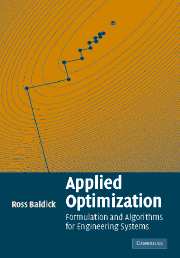Book contents
- Frontmatter
- Contents
- List of illustrations
- Preface
- 1 Introduction
- 2 Problems, algorithms, and solutions
- 3 Transformation of problems
- Part I Linear simultaneous equations
- Part II Non-linear simultaneous equations
- Part III Unconstrained optimization
- Part IV Equality-constrained optimization
- Part V Inequality-constrained optimization
- References
- Index
3 - Transformation of problems
Published online by Cambridge University Press: 03 December 2009
- Frontmatter
- Contents
- List of illustrations
- Preface
- 1 Introduction
- 2 Problems, algorithms, and solutions
- 3 Transformation of problems
- Part I Linear simultaneous equations
- Part II Non-linear simultaneous equations
- Part III Unconstrained optimization
- Part IV Equality-constrained optimization
- Part V Inequality-constrained optimization
- References
- Index
Summary
In this chapter we consider ways to transform problems. Such transformations are critical in matching a problem to the characteristics of an algorithm. Sometimes the transformation is done implicitly by formulating the problem in a particular, perhaps non-obvious, way. In several of the examples in this book, however, we will first formulate the problem in what might be considered a “natural” way and then look for ways to transform the problem to allow an algorithm to be effective. We will see that problem transformation is one of the key elements in matching a problem to an effective algorithm.
For example, we can think of transforming:
the variables or equations of a system of simultaneous equations, or
the objective, variables, or constraints of an optimization problem,
to create a new problem. Typically, to be useful, the numbers of variables and constraints (or equations) in such a transformed problem should be not significantly larger than the numbers of variables and constraints (or equations) in the original problem. We could then consider the original and transformed problems to be “equivalent” if:
given a solution of the original simultaneous equations it was easy to calculate a solution of the transformed simultaneous equations and vice versa, or
given the optimum and an optimizer of the original optimization problem it was easy to calculate the optimum and an optimizer of the transformed optimization problem and vice versa.
More formal notions of problem equivalence and of “easy” can be found in [40].
- Type
- Chapter
- Information
- Applied OptimizationFormulation and Algorithms for Engineering Systems, pp. 103 - 158Publisher: Cambridge University PressPrint publication year: 2006
- 1
- Cited by



